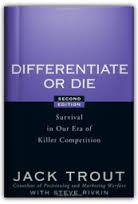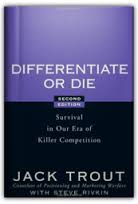I have been coaching more and more clients on developing their Brand Promise and Brand Promise Guarantee. There are many components of each. To develop the Brand Promise, we identify the core customer, their needs, key activities that will support the Brand Promise, and how we are going to measure the effectiveness of it.
After we develop the Brand Promise, we develop a Brand Promise Guarantee (BPG). The intent of the BPG is to create a mechanism that will guarantee you keep your promise to the customer, which reduces or eliminates the customer’s risk in doing business with you. There are several components that we work through in developing the guarantee, such as the following: How does it hurt us? How does it improve us? Does it help close sales? And finally, does it make us different?
It is this component of the Brand Promise Guarantee—making us different— that I would like to spend some time on in this blog.
Doug Hall, owner of the Eureka Ranch, says, “if you are not unique, you had better be cheap!” I could not agree more. Companies that compete in a commodity space experience low or diminished margins. Products and services that stand apart demand value-based prices, not just cost plus margin.
So how do you set your offerings apart? The answer is to find ways to differentiate yours products or services from the competition. I was looking through my bookcase and came across a book I acquired years ago titled Differentiate or Die written by Jack Trout. Jack is a marketing guru and has written many books on the subject through the years. I think there are some good concepts in this book worth sharing.
competition. I was looking through my bookcase and came across a book I acquired years ago titled Differentiate or Die written by Jack Trout. Jack is a marketing guru and has written many books on the subject through the years. I think there are some good concepts in this book worth sharing.
Let's start with what won’t set you apart. Attributes like quality, creativity, price, and breadth. There are exceptions to these, but in general, they are either table stakes, or difficult value propositions to compete on.
So here are some ways you can differentiate your products and services:
1. Being first is a differentiating idea. People do not like change, so being the first to do what you do is a big advantage. In addition, when competitors copy your idea it reinforces your offering. Think Harvard as the first college in America and still perceived as the leader.
2. Attribute ownership is the number one way to differentiate. An attribute is a characteristic, peculiarity, or distinctive feature that sets you apart. Think of Crest toothpaste and cavity protection.
3. Leadership is a way to differentiate. This is the most powerful way to differentiate a brand. People give respect and admiration to the biggest and tend to be more trusting of what you offer. Think of IBM and Coca Cola.
4. Heritage is a differentiating idea. People place importance on companies that have been around for a long time and develop trust in the longevity. They also find comfort in the tradition of the company. Think Steinway pianos, the instrument of immortals.
5. Market specialty is a differentiating idea. People are impressed with those that concentrate on a specific product and consider them experts at what they offer. Think of Smucker’s when it comes to jellies. They are the market leader in their space.
6. Preference is a differentiating idea. As Ram Charan says, “Do your customers prefer you?” The concept is based on supplying what others think is correct. Think of Tylenol as the number one pain reliever in America.
7. How a product is made can be a differentiating idea. People are influenced by products that are patented or use propriety technology or fresh ingredients. Think Papa John’s Pizza who bases their whole marketing campaign on fresh as a way to set themselves apart in a crowded space.
8. Being the latest. There are customers that always crave the latest, greatest innovation or product offering and tend to be early adopters. Keeping your offering fresh and on the cutting edge moves people to action, and no one wants to buy an obsolete product. Think Intel who constantly makes their chips obsolete by offering newer ones that are more powerful.
9. Hotness is a way to differentiate. Some products hit the “tipping point” as Malcolm Gladwell would say, by being accepted and desired by the masses. Pulling out the marketing stops when a product is hot can generate great returns. Think Under Armor and their rise from a layering garment into a complete brand.
So think about the concepts above as they relate to your product or service. How do you differentiate? Does it support your Brand Promise Guarantee to set you apart from your competition and help drive sales?
Let me know your thoughts and plan well, Alan
Photo Credit: iStock by Getty Images



 LinkedIn
LinkedIn
 Facebook
Facebook

